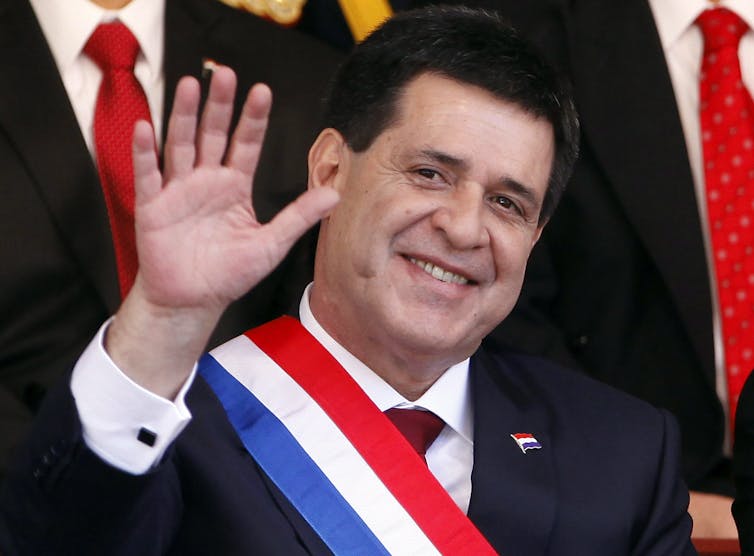On Sep. 25, 2018, the World Health Organization (WHO) Protocol to Eliminate Illicit Trade in Tobacco Products entered into force. According to the WHO, illicit trade refers to “any practice or conduct prohibited by law and which relates to production, shipment, receipt, possession, distribution, sale or purchase, including any practice or conduct intended to facilitate such activity.”
Most research on the illicit tobacco trade so far has focused on the role of transnational tobacco companies. As the WHO Protocol is implemented, far more attention needs to be paid to how the illicit tobacco trade is evolving.
My colleagues in the Global Tobacco Control Research Programme and I just published two papers to address this gap and inform the implementation of the protocol. We examine transnational tobacco companies’ complicity in Paraguay’s illicit tobacco trade and its evolution from the 1960s onwards, which enabled the subsequent rise of local manufacturer Tabacalera del Este, known as Tabesa. We uncovered new evidence of Tabesa’s international expansion, largely through the illicit trade.
Global illicit tobacco trade
The illicit tobacco trade is a major problem worldwide. One out of nine cigarettes smoked worldwide is illegal. Cheaper cigarettes mean greater consumption, diseases and deaths, especially among poor and young people. Eliminating the global illicit tobacco trade by 2030 would save an estimated 164,000 lives annually: 32,000 in high-income countries and 132,000 in low- and middle-income countries.
The illicit trade also undermines tobacco control efforts and deprives governments of an estimated $40.5 billion in revenue per year. It strengthens organized crime groups by providing income and money-laundering opportunities and distribution channels. It also worsens problems of weak governance and corruption.
Paraguay’s illicit trade in tobacco products was originally seeded by British American Tobacco (BAT) and Philip Morris international (PMI). Starting in the 1960s, both companies used Paraguay as a transit hub to illegally access the protected markets of Argentina and Brazil. The substantial market and supply system that these companies developed for cheap smuggled brands, in turn, created a lucrative business opportunity for manufacturers in Paraguay.
In 1999, Brazil introduced a 150 per cent tax on exports to other Latin American countries with a view to ending the transnational tobacco scheme, through which cigarettes were sent to Paraguay and then re-sold illegally in Brazil. But Paraguayan manufacturers were ready to fill the vacuum.
The role of Paraguay
Between 1989 and 1994, Paraguayan cigarette production was below the domestic consumption of three billion sticks. Then, between 1995 and 1998, local manufacturing grew exponentially to over 12 billion sticks annually, despite consumption stagnating.
Between 1999 and 2003, after Brazil’s introduction of the aforementioned export tax, Paraguayan cigarette production expanded even further, doubling to almost 27 billion sticks by 2003, about eight times the domestic consumption. This increase can be largely attributed to the illicit trade, as legal exports remained limited.
The key company behind this expansion was Tabesa. Founded in 1994 by siblings Horacio and Sarah Cartes, Tabesa is today one of Paraguay’s largest companies. Buoyed by his success as a businessman, Horacio Cartes was elected president of Paraguay (2013-2018) and is now a senator.
Paraguay’s former President Horacio Cartes waves to the crowd while attending a military parade after he took office in 2013.
By the late 2000s, Tabesa had become a major supplier of illicit tobacco products across Latin America and increasingly beyond. Although Brazil continues to account for the bulk of Tabesa’s revenues, our findings suggest the company now aspires to become a transnational tobacco company.
We present new trade data suggesting Tabesa’s continued growth and complicity in illicit trade beyond the immediate region — including Europe and Asia.
Billions of cigarettes unreported
Tabesa executives have told Paraguayan journalists that they legally export to a number of countries, including Bulgaria, Curaćao, the Netherlands Antilles and the Netherlands.
However, between 2001 and 2016, there were no cigarette exports reported by Paraguay to Bulgaria, nor any cigarette imports reported by Bulgaria from Paraguay.
In that period, Paraguay reported exports of 1.4 billion cigarettes to Curaçao, 481.2 million cigarettes to the Netherlands Antilles, and 111.4 million cigarettes to the Netherlands, yet none of those countries reported any cigarette imports from Paraguay.
Between 2001 and 2016, 5.7 billion cigarettes officially shipped by Paraguay to 10 markets where Tabesa exported to were unaccounted for.
These discrepancies suggest illicit trade.
Crucially, Tabesa has mimicked some of BAT and PMI’s strategies. These include complicity in the illicit trade, relying on the same distribution networks and using arguments previously used by other tobacco companies to defend themselves against accusations of complicity in the illicit trade. An estimated 70 per cent of Tabesa’s revenue comes from sales in Brazil, which the company does not officially export to.
Devastating public health consequences
Journalists at the Paraguayan newspaper ABC Color wrote a series of articles on our papers, for which they interviewed Tabesa CEO José Ortiz. Mr Ortiz now claims that many of their products — millions of which have been seized by Brazilian law enforcement — are counterfeited in clandestine factories.
However, based on data on the company’s imports of acetate tow (a fiber used for cigarette filters), cigarette paper, filter paper and other cigarette components, we estimate that Tabesa imports enough to produce 25-36 billion cigarette sticks per year.
The case of Paraguay demonstrates the long shadow cast by transnational tobacco companies, whose practices have had devastating consequences in terms of public health, weak governance, corruption and organized crime.
It also underlines the importance of 1) increasing understanding of the risks to global health posed by local companies aspiring to compete with transnational companies, 2) addressing the lack of independent and rigorous data on the illicit tobacco trade in the region, and 3) fully implementing the WHO Framework Convention on Tobacco Control (FCTC) and its Protocol on Eliminating Illicit Trade in Tobacco Products.
Industry interference
Article 5.3 of the FCTC on industry interference in policy making is particularly salient here. The presidency of Horacio Cartes presented clear conflicts of interest.
The Paraguayan parliament, where Cartes now sits, rejected a bill to enhance transparency along the tobacco supply chain. They also postponed the vote on another bill that would increase taxation on tobacco products, despite taxation being “the single most important factor driving down smoking.”
Cartes’s successor President Mario Abdo Benítez just announced his decision to sign the FCTC Protocol on the illicit tobacco trade. Time will tell whether the new government is also committed to fully implementing it, holding the industry accountable, and addressing the deeply-rooted issues of weak governance and corruption.



 Elon Musk’s Empire: SpaceX, Tesla, and xAI Merger Talks Spark Investor Debate
Elon Musk’s Empire: SpaceX, Tesla, and xAI Merger Talks Spark Investor Debate  South Korea’s Weak Won Struggles as Retail Investors Pour Money Into U.S. Stocks
South Korea’s Weak Won Struggles as Retail Investors Pour Money Into U.S. Stocks  Trump Lifts 25% Tariff on Indian Goods in Strategic U.S.–India Trade and Energy Deal
Trump Lifts 25% Tariff on Indian Goods in Strategic U.S.–India Trade and Energy Deal  Global Markets Slide as AI, Crypto, and Precious Metals Face Heightened Volatility
Global Markets Slide as AI, Crypto, and Precious Metals Face Heightened Volatility  Trump Endorses Japan’s Sanae Takaichi Ahead of Crucial Election Amid Market and China Tensions
Trump Endorses Japan’s Sanae Takaichi Ahead of Crucial Election Amid Market and China Tensions  China Extends Gold Buying Streak as Reserves Surge Despite Volatile Prices
China Extends Gold Buying Streak as Reserves Surge Despite Volatile Prices  Trump Signs Executive Order Threatening 25% Tariffs on Countries Trading With Iran
Trump Signs Executive Order Threatening 25% Tariffs on Countries Trading With Iran  Dollar Near Two-Week High as Stock Rout, AI Concerns and Global Events Drive Market Volatility
Dollar Near Two-Week High as Stock Rout, AI Concerns and Global Events Drive Market Volatility  FxWirePro- Major Crypto levels and bias summary
FxWirePro- Major Crypto levels and bias summary  Bank of Japan Signals Readiness for Near-Term Rate Hike as Inflation Nears Target
Bank of Japan Signals Readiness for Near-Term Rate Hike as Inflation Nears Target  India–U.S. Interim Trade Pact Cuts Auto Tariffs but Leaves Tesla Out
India–U.S. Interim Trade Pact Cuts Auto Tariffs but Leaves Tesla Out  Silver Prices Plunge in Asian Trade as Dollar Strength Triggers Fresh Precious Metals Sell-Off
Silver Prices Plunge in Asian Trade as Dollar Strength Triggers Fresh Precious Metals Sell-Off 
































